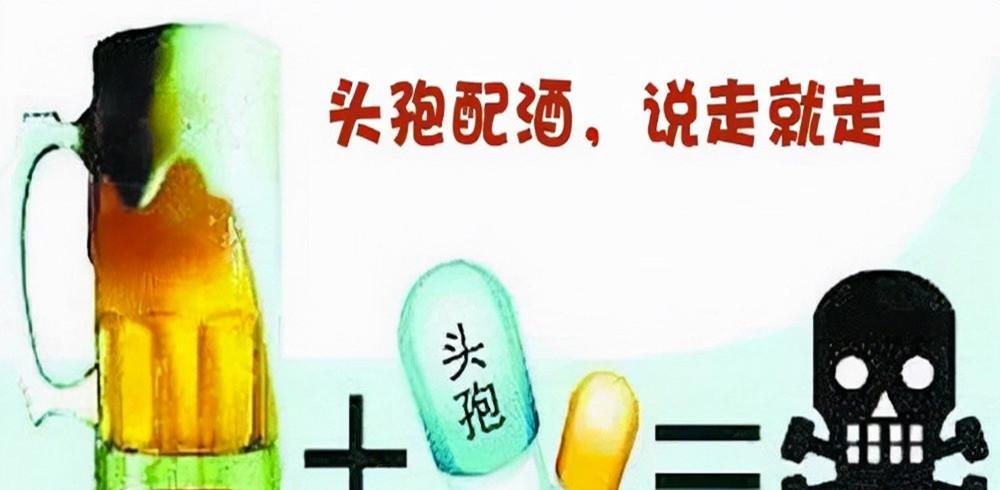"Cephalosporin is wine, say go away".
This is because eating or injecting cephalosporin antibiotics and drinking alcohol can cause adverse reactions and, in severe cases, can be fatal. Therefore, there is a saying that "cephalosporin is wine, and it is said to go away". Pharmacists in pharmacies must tell them when they send antibiotics, and they can't drink alcohol when taking medicine!

The adverse reactions that occur together with cephalosporin antibiotics and alcohol are called "disulfiram-like reactions."
Disulfiram is a medicine, also known as "alcohol abstinence sulfur", which was originally used as a drug for alcohol cessation. Because this disulfiram is eaten, absorbed in small amounts and then drunk, it will affect the metabolism of alcohol, that is, ethanol, and people will have various discomforts, such as facial flushing, fever, headache, nausea, vomiting, etc., and will have a sense of disgust for drinking and are unwilling to drink. This discomfort caused by eating disulfiram and drinking alcohol is called "abstinence sulfur (disulfiram) reaction", so disulfiram is used to quit drinking. Now, this drug is also being studied to fight tumors!
Cephalosporins can also cause this adverse reaction with alcohol. This is because many cephalosporins contain some chemical structures similar to disulfiram, so such adverse reactions are called "disulfiram-like reactions".
However, will only cephalosporins have this "disulfiram-like reaction" with alcohol? Far beyond that, a lot of drugs happen.
Many drugs and alcohol have a "disulfiram-like reaction" together!
Because these drugs either have the same chemical group as disulfiram - "methylthiotetrazolium group", or have other identical, similar chemical structures, or have disulfiram-like effects.
Originally, alcohol (ethanol) was to be metabolized into carbon dioxide and water in the liver step by step, but the drug would inhibit the metabolism of ethanol. Ethanol reaches the liver, and it cannot be metabolized at the step of just metabolizing to acetaldehyde. Acetaldehyde accumulates in the body, combined with some proteins, nucleic acids and so on in the body, destroying these substances; acetaldehyde and other metabolites will also excite sympathetic nerves, affect the permeability of blood vessels, affect neurotransmitters in the brain, and affect a variety of neurotransmitters that act on cardiovascular diseases. As a result, the function of nerves, hearts, blood vessels and other organs is not normal, people will have a variety of discomfort: facial flushing, headache, dizziness, fever, sweating, blurred vision, palpitations, chest tightness chest pain, shortness of breath, nausea, vomiting, abdominal pain, diarrhea, etc., serious can cause angina, myocardial infarction, arrhythmia, heart failure, shock, can convulse, aphasia, coma, liver damage, etc., and then serious will cause death.
In this case, sometimes it is a disulfiram-like reaction, and sometimes it is really a heart disease and cerebrovascular disease attack, and the two conditions are confused together, which is even more dangerous.
Therefore, in addition to cephalosporin, these drugs can not be "drunk".
Among the drugs, the most important and common is antibiotics. Cephalosporins are known, as well as nidimidazole, that is, very commonly used metronidazole, tinidazole, ornidazole, etc.; there are also quinolones, that is, what is "sathorin", levofloxacin, moxifloxacin, etc.; there are other antibacterial drugs such as erythromycin succinate, ketoconazole, chloramphenicol, griseofulvin, isoniazid, compound sulfamethoxazole, isoniazid, furundarone, nitrofurate, furantantin and so on.
Then there are hypoglycemic drugs, sulfonylureas, and now mostly use "glide", such as glibenclamide, glipizide, gliclazide, etc., as well as chloropropamide, methanesulfame, phenyletamide, torasulfonylurea, hexanurea acetate and insulin.
Other drugs include anticoagulant warfarin, uric acid-lowering allopurinol, anti-allergic diphenhydramine, tea-hexhaimin, and cyprocheptadine.
Drinking alcohol stomach discomfort take some stomach medicine? Omeprazole and ranitidine, which inhibit gastric acid, also respond.
Drinking alcohol and getting excited to take some sedative sleeping pills? Barbiturates, chlorpromazine, trifluorolazine, tolasulin, and chloral hydrate may also react.
Drinking angina attacks Eat some anti-angina nitroglycerin, isosorbide nitrate (heartache)? Disulfiram-like reactions are even more deadly.
It is a compound licorice mixture that is commonly used to suppress cough and phlegm, yin and lung syrup, and the contraceptive pill cyproterone acetate has also been reported.
Let's compare it for yourself!
Not only alcohol, but also other foods and drugs containing alcohol will also react.
Alcohol-containing drugs will react, such as ten drops of water, huoxiangzhengqi water, nitroglycerin, hydrocortisant, etc., alcohol for external disinfection, medicinal liquor preparations, tinctures and elixirs.
Alcoholic foods can also be eaten, such as heart sugar, heart chocolate, drunken shrimp and crab, sake brewing (mash), cooking wine fish soup, fermented foods, pickled products, etc.
Drinking and taking medication must be missed, missing enough days.
Drink alcohol and do not take medicine. Generally required, do not drink alcohol for 3 days before taking the drug. If you need medication urgently, be sure to make it clear to your doctor.
You can't drink alcohol after taking medicine. At least 7 days, 10 days or two weeks is better and safer because there are reports of 14 days of discontinuation of the drug and reactions to alcohol.
(All rights reserved, may not be reproduced without my authorization!) )